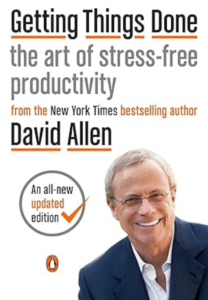
In today’s office, particularly if you’re combatting work-from-home distractions, there is a lot that is vying for our attention. There are tons of work to-dos coming in throughout the day: pings on Slack and other messaging apps, dings of a new email, and rings of the phone, whether for a client call…or your best friend wanting to catch up for an hour. (Not to mention that just working from home with all those distractions tends to limit our productivity. Here’s more info on increasing your work-from-home productivity >>)
How do you not only prioritize it all but remember it all in the first place? If you’re like me, you think, “Oh yeah, I’ll remember to do that. It’s super important.” And then forget to do it because some other ding, beep, buzz, or other distraction prevents you from completing the task at hand.
Our Book Pick
In the bestselling Getting Things Done, productivity consultant David Allen breaks down his time management system of the same name. (You can also find an accompanying workbook that breaks down the concepts in the book into small, manageable chunks so you can implement them while learning).
Let’s get one thing out of the way: There are some obsolete sections (like when he talks faxes and other nonessential home office stuff). But the main ideas are still very relevant.
What You’ll Learn
Getting Things Done walks you through how you can get all the tasks—big and small, must do and want to do—that are on your mind, off your mind. Otherwise, you run the risk of overloading your brain with must-dos and are hit with a paralysis that prevents you from taking action on any one of them.
Once you offload the tasks, Allen walks you through how to apply the “do it, delegate it, defer it, drop it” rule and break each task into actionable to-do items within a specified time period that he calls “known time limits.”
This allows you to prioritize all your to-do items, without running the risk of forgetting about them all together.
For copywriters, this is of the utmost importance. As a service provider, you are expected to remember when a client gives feedback in an offhand remark on a Zoom call, sends through a last-minute detail about a project via email, asks you a question via their project management platform, asks for edits, or any number of “little” details.
As much as you think you’ll remember to do something, we’re human. This is a must-read if you’ve ever popped up at 2 a.m. thinking, “I forgot to send my client that!” Or, like me writing this blog post, “Did I schedule that to go live?!” But it’s probably even more of a must-read if you think you’ve got a stellar memory. You will be surprised at what is slipping through the cracks and/or how much stress you can reduce by taking a more organized approach.
When you have multiple projects with multiple clients in various stages of the project process, you need external reminders of what needs to get done when. They’re not just nice to have; they’re a must have if you want to succeed.
Your Turn
What are your best tips for maximizing your productivity? Share your insights with the community by adding a comment below!
Note: This post contains affiliate links.
Last Updated on January 29, 2024

I definitely find slotting my work into chunks of 30 minutes to 1 hour helps – and having a timer, too, to ensure I take designated breaks. Creativity is taxing on the brain and wears us out quickly.
Pomodoro techniques, a timetable and a priority list generally work for me, but being consistent in getting organised is key!
Timers are a great tactic for taking breaks! Thanks for sharing such great insights 🙂
Your copywriting skills worked! I just downloaded the book on my Kindle. Lol! Seriously though, thank you for the information and book recommendation. I currently use my digital planner on my iPad to help me keep track of everything, but it’s certainly a work-in-progress system.
Enjoy the book! And you are 100% correct, we are all works-in-progress!